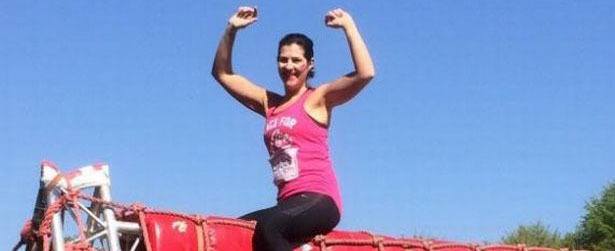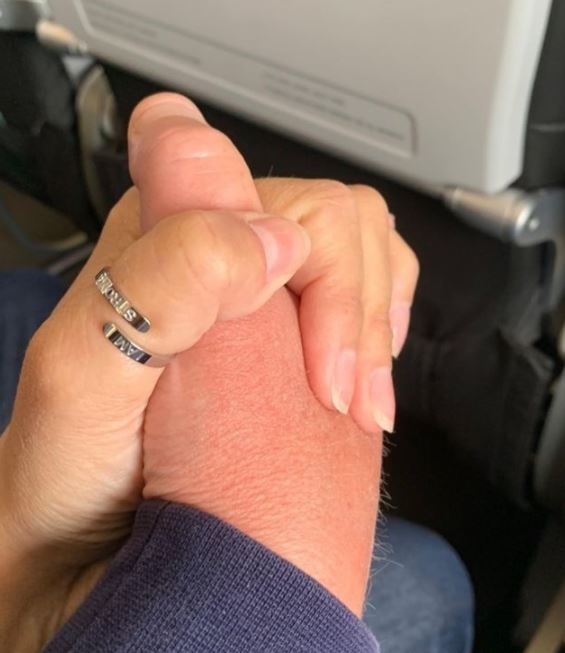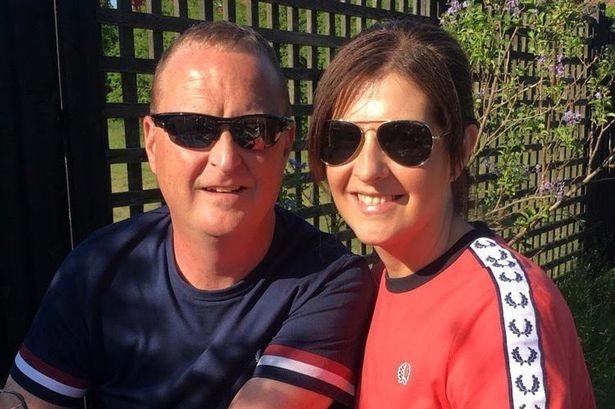
Ivy Blog
Glioblastoma Patient Story: UK Mother Finds Hope in Arizona at Ivy Brain Tumor Center
- July 20, 2021
- Ivy Center
- Posted in Patient Stories

With the largest Phase 0 clinical trials program in the world, it’s no wonder that patients from across the globe travel to the Ivy Brain Tumor Center at Barrow Neurological Institute for treatment. The idea of traveling so far may feel overwhelming, but Ivy Phase 0 clinical trials allow patients to receive individualized treatment in a fraction of the time and cost associated with traditional drug research and development, and the Ivy Center’s staff is there to support them every step of the way. Those with even the most aggressive brain tumors can receive treatment and help contribute toward finding a cure for brain cancer.

Louise’s Story
In December 2019, United Kingdom resident Louise Hulme, who was the picture of health at 46 years old, began suffering from severe headaches. The mother of two was told it might be migraines—as someone extremely fit, who went to the gym five days a week, what else could it be? But on Jan. 2, 2020, Louise was out shopping the New Year sales with her mother and sister when she had an episode with yet another severe headache and became confused about where she was. Her mother rushed her to Warrington Hospital, where she was diagnosed with a brain tumor.
Less than three weeks later, Louise was operated on, removing 90% of her tumor, which in late January was confirmed a stage 4 Glioblastoma. Throughout 2020, on top of the woes of the COVID-19 pandemic, Louise underwent radiation and chemotherapy treatments. By her side was her childhood sweetheart and husband of 27 years, Kevin Hulme.
After a long 2020 of being quarantined, Louise had an appointment in Liverpool, when she received the news that her tumor was growing. “But every cloud has a silver lining, as we used the time at home to research, research and research some more, during which, we came across the Ivy Brain Tumor Center in Phoenix, Arizona,” her husband Kevin explained.
The Ivy Phase 0 Clinical Trial
After reaching out to the team at Ivy Brain Tumor Center, it was determined that Louise qualified for an Ivy Phase 0 clinical trial for a radiation sensitizing drug, pamiparib, in patients with newly diagnosed or recurrent glioblastoma. Patients in this trial take pamiparib for four days leading up to a scheduled operation to remove their tumor. Within days of the operation, the team works to determine if the drug penetrated the patient’s tumor. Patients with positive results may advance to an expansion phase of the study, which combines therapeutic dosing of pamiparib with fractionated radiotherapy. If pamiparib does not show evidence of sufficient tumor penetration, patients can pivot to another therapy or clinical trial without losing time or receiving ineffective treatment.

An International Journey to Receive World-Class Brain Tumor Treatment
“After many challenges to get to the United States during these difficult times due to COVID-19 restrictions…we arrived in May,” Kevin explained. “This was only possible with the help of the Ivy team supporting our application with the US Embassy.”
In May 2021, Louise and Kevin began their long journey from the United Kingdom to Arizona to begin her treatment, thanks in part to more than 2,500 GoFundMe donors who chipped in to support the costs associated with traveling internationally for treatment. Once they arrived, the couple met the Ivy Center team and Louise began the Phase 0 trial, starting on the trial drug and receiving surgery a few days later from internationally recognized neurosurgical oncologist, Dr. Nader Sanai. Two days after her successful tumor resection, Louise was discharged.
“During our time at the Ivy Center, the doctors and care team members were absolutely incredible; meticulous, but well-paced, and very, very caring and personable,” Kevin said. “The actual surgery is one thing, but being thousands of miles from home without family makes it far more difficult. The team at the Ivy Center, who we now consider extended family, couldn’t have made us feel more at home, while ensuring us we were definitely in good, safe hands.”
Soon after completing the Phase 0 trial, Louise found out she qualified for the Phase 2 portion of the trial, which combines therapeutic dosing of pamiparib with fractionated radiotherapy. A couple of days into the trial Louise had what was thought to be an infection, but turned out to be brain and spinal fluid, necessitating an emergency surgery. Luckily, Louise quickly bounced back and continues her trial today.
#HopeForLouise
“Nothing can keep this incredible woman down, she is truly inspirational,” Kevin shared. “The decision for Louise to go to America for the initial operation and trial was always a massive decision, we knew it would never be an easy journey, but nothing worth having comes easy.”
The idea of coming from somewhere as far away as the United Kingdom and staying for days, and possibly weeks, can feel daunting, but the Ivy team helps patients find affordable and supportive housing to stay in during their time at the Ivy Center. Resources such as the Editha House help patients like Louise find a compassionate and supportive home-away-from-home atmosphere that helps reduce emotional and financial challenges during a vulnerable time in one’s journey.

“We cannot thank the Ivy Center enough—every doctor, every nurse and every member of support staff that we were fortunate enough to meet,” Kevin said. “Louise genuinely feels like she’s won the lottery. We still have a long way to go and we are keeping our fingers crossed, but at least now we have HOPE. It’s all thanks to this amazing team who agreed to take on Louise’s very complex diagnosis and challenge the status quo to discover a cure for this terrible condition.”
This story is for general health information only and is not meant to be used as medical advice, diagnosis or treatment. Please consult your physician or healthcare provider before beginning any treatment protocol or with any questions. This story reflects the health status of this particular patient at the time the story was written and photographs were taken. The patient’s condition may have changed over time.
